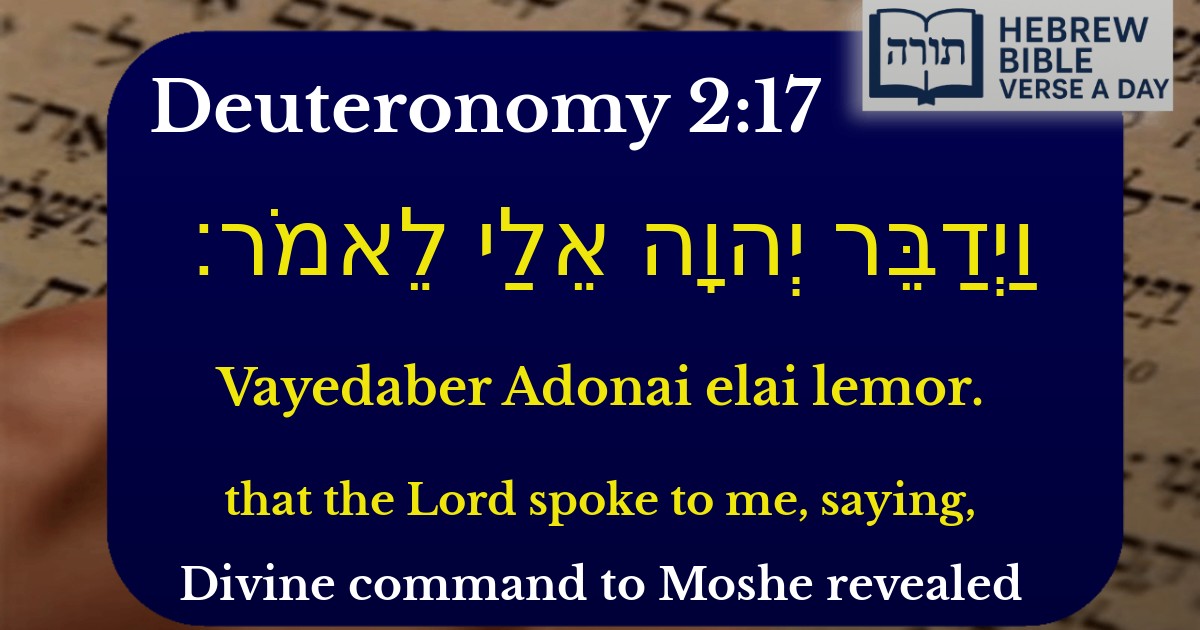Frequently Asked Questions
Q: What does 'that the Lord spoke to me, saying' mean in Deuteronomy 2:17?
A: This phrase introduces a direct communication from Hashem to Moshe (Moses). In Jewish tradition, it emphasizes the divine origin of the commandments and teachings that follow. Rashi explains that this wording underscores the importance of carefully listening to and following Hashem's instructions.
Q: Why is it significant that Hashem spoke directly to Moshe?
A: This demonstrates Moshe's unique role as the greatest prophet (Devarim 34:10). The Rambam (Maimonides) teaches in Hilchos Yesodei HaTorah that Moshe's prophecy was fundamentally different from all other prophets - he communicated with Hashem clearly and directly, which is why the Torah repeatedly uses this phrasing.
Q: How does this verse connect to the surrounding context in Deuteronomy?
A: This verse introduces Hashem's instructions about the Israelites' journey through the wilderness. The Sforno explains that these words come to validate Moshe's leadership and the divine guidance during their 40 years in the desert, showing that every step was directed by Hashem.
Q: What can we learn today from 'Hashem spoke to me' in the Torah?
A: The Talmud (Berachos 6a) teaches that although prophecy has ceased, we can still 'hear' Hashem's word through Torah study. This verse reminds us that the Torah contains Hashem's eternal messages to us, and we should approach Torah learning with the same reverence as if hearing it directly from Hashem.
Q: Why does the Torah repeat phrases like 'Hashem spoke to me' so often?
A: The Midrash (Sifrei) explains that this repetition serves multiple purposes: 1) To emphasize the divine origin of each commandment, 2) To show that Moshe didn't add anything of his own, and 3) To teach us that every word of Torah is equally important and comes directly from Hashem.


Understanding the Phrase "וַיְדַבֵּר יְהוָה אֵלַי לֵאמֹר"
This phrase, commonly found in prophetic passages, signifies divine communication between Hashem and a prophet. The term "וַיְדַבֵּר" (spoke) implies a direct and clear transmission of prophecy, as opposed to other forms of divine revelation like dreams or visions (see Rambam, Hilchot Yesodei HaTorah 7:6).
Rashi's Commentary
Rashi (Devarim 2:17) notes that the phrase "אֵלַי לֵאמֹר" (to me, saying) often indicates that the prophet is commanded to relay the message to others. The doubling of language ("spoke to me, saying") emphasizes the prophet's role as an intermediary, conveying Hashem's words faithfully to the people.
Rambam on Prophetic Communication
In Moreh Nevuchim (2:45), Rambam explains that divine speech ("דִּבּוּר") is a metaphor for the transmission of divine will, adapted to human understanding. The phrase underscores the unique relationship between Hashem and His prophets, who receive and transmit Torah truths with precision.
Talmudic and Midrashic Insights
Grammatical Nuance
The prefix "וַיְ" (vav consecutive) indicates a sequential action, often linking the prophecy to a specific context or preceding event. This grammatical form is frequent in Tanach to denote the unfolding of divine communication in historical time.